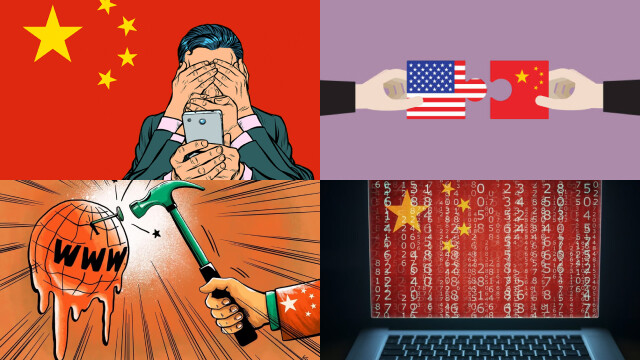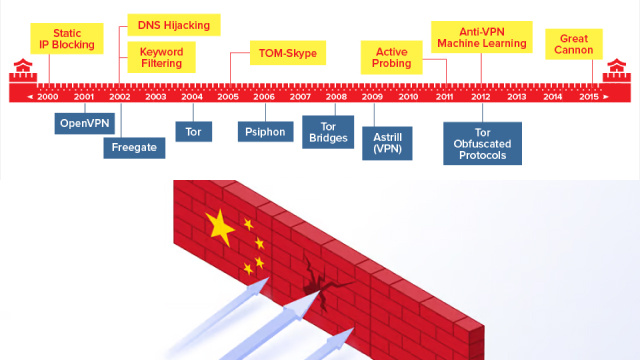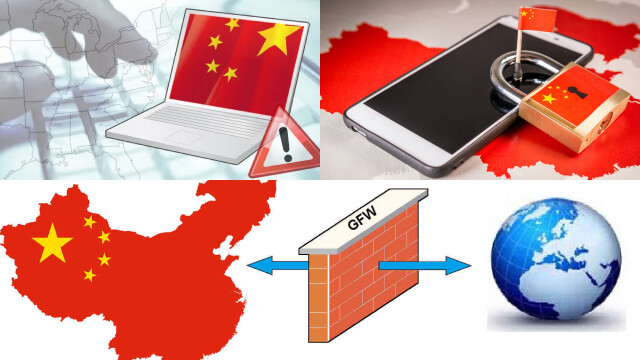Introduction to the Great Firewall of China
The Great Firewall of China is a colloquial term used to describe the extensive system of internet censorship and surveillance used by the Chinese government to regulate access to information online. The system is composed of a series of technical measures that monitor, filter, and limit access to online content deemed inappropriate or critical of the government.

This includes social media platforms, news outlets, and other websites that the Chinese government deems to be a threat to national security or social stability. The Great Firewall has been criticized for limiting freedom of expression, stifling innovation, and hindering economic growth.
Despite these criticisms, the Chinese government has maintained the Great Firewall as a means of controlling the flow of information within the country and maintaining its hold on power.
The Censorship and Surveillance Techniques Used in China
China has one of the most extensive and sophisticated systems of internet censorship and surveillance in the world. The government uses a combination of technical and non-technical measures to control access to information online and monitor citizens’ online activities.
These techniques include keyword filtering, IP identifying, DNS tampering, and deep packet inspection, among others. The government also employs a large number of human censors to manually review and remove content deemed sensitive or critical of the government.
Surveillance techniques include facial recognition technology, tracking of mobile devices, and the use of AI-powered systems to monitor social media and other online activities. The Chinese government justifies these measures as necessary to maintain social stability and national security, but they have been widely criticized for violating human rights and suppressing free speech.
The Risks of Internet Censorship in China
Internet censorship in China poses a significant risk to individual freedom of expression, human rights, and access to information. The Chinese government heavily controls and monitors online activity, censoring content that is deemed critical of the government or threatens social stability.
This censorship restricts access to essential information and hinders innovation, which can have economic and social consequences.
Moreover, the censorship system is not transparent, leaving individuals uncertain about what is and is not acceptable to post online. This ambiguity can lead to self-censorship, where individuals choose not to express their opinions online for fear of repercussions, ultimately limiting the free flow of ideas and opinions.

The surveillance that goes hand-in-hand with censorship poses additional risks. The government collects vast amounts of data on its citizens, which can be used to monitor and control their activities. This surveillance can have a chilling effect on the expression of dissenting views and can discourage participation in online activism and social movements.
Furthermore, the lack of privacy protections and government monitoring can lead to the dissemination of personal information, making individuals vulnerable to cyberattacks and identity theft. The Chinese government has been known to use these methods to stifle opposition and limit free speech.
Overall, internet censorship and surveillance in China have serious consequences for individuals’ fundamental human rights, including freedom of expression and privacy. It is important to raise awareness of these issues and advocate for greater transparency and protection of individual rights online.
How to Access Any Websites and Apps in China
Accessing any websites and apps in China can be a challenge due to the Great Firewall, which is a system of censorship and internet surveillance. However, there are several ways to bypass these restrictions and access the content you want.
One popular method is using a virtual private network (VPN). A VPN encrypts your internet traffic and routes it through a server in another country, making it appear as if you are accessing the internet from that location. This can help you bypass the Great Firewall and access any websites and apps.
Another option is using a proxy server, which acts as an intermediary between your device and the internet. Proxy servers can help you access all websites by masking your IP address and location.
In addition, some websites and apps have alternate URLs that are available in China. For example, some social media platforms have URLs that are specific to China and are not subject to censorship.
It’s important to note that while these methods may help you access any content, they do come with some risks. Using a VPN or proxy server may violate Chinese laws and could result in consequences such as fines or imprisonment. It’s also possible that the Chinese government could block these methods at any time.
Therefore, it’s important to use caution and understand the potential risks before attempting to access not allowed websites and apps in China.
Using VPNs to Bypass the Great Firewall of China
The Great Firewall of China is a robust censorship and surveillance system that restricts access to foreign websites and apps. However, with the use of a Virtual Private Network (VPN), it is possible to bypass the restrictions and access any content. A VPN creates an encrypted connection between your device and a remote server, allowing you to access the internet anonymously and securely.

When using a VPN in China, it’s essential to choose a reputable provider that can reliably bypass the Great Firewall. It’s also crucial to choose a server location outside of China to access any websites and apps. However, it’s important to note that the Chinese government has been cracking down on VPNs in recent years, making it more challenging to find a reliable provider.
Furthermore, while using a VPN can help you access limited content, it’s not a foolproof solution. The Chinese government has been known to actively restrict VPN traffic, and using one can be considered illegal. Therefore, it’s important to use a VPN with caution and understand the potential risks involved.
How to Choose the Best VPN for China
If you’re planning to use a VPN to bypass the Great Firewall of China, it’s important to choose the right one. Not all VPNs are created equal, and some may not work well in China due to the government’s efforts to block them.
When choosing a VPN, look for one that has a strong track record of bypassing Chinese censorship.
Additionally, it’s important to choose a VPN that offers strong encryption to protect your privacy and security while browsing. You may also want to choose a VPN with servers located in nearby countries, as this can help improve speed and reliability.
Before committing to a VPN, it’s a good idea to read reviews and do some research to ensure that it’s a good fit for your needs. With the right VPN, you can bypass the Great Firewall of China and access the internet freely and securely.
Alternative Ways to Access Any Websites You Want in China
If you’re unable to access certain websites in China through VPNs, there are alternative methods to bypass censorship. One option is to use a proxy server, which acts as a middleman between your device and the website. Another option is to use Tor, which routes your internet traffic through a series of servers, making it difficult for anyone to trace your online activity.

However, note that these methods may not be as secure or reliable as using a VPN. Another option is to use a SmartDNS service, which allows you to access restricted content by altering your DNS settings. However, this method does not encrypt your internet traffic and may not work for all websites.
Additionally, some users may choose to access any websites through mobile data networks or satellite internet providers, which are not subject to the Great Firewall’s restrictions.
Tips for Staying Safe While Bypassing the Great Firewall of China
Bypassing the Great Firewall of China can be risky, but there are ways to stay safe while doing so. Firstly, it’s important to choose a reputable VPN provider and use it with caution. Avoid logging into personal accounts or transmitting sensitive information while connected to a VPN.
Secondly, keep your VPN software up-to-date and ensure it has strong encryption protocols. It’s also wise to use two-factor authentication and strong passwords for your online accounts.
Finally, be aware of Chinese laws and regulations around internet usage and try to avoid any activities that may be deemed illegal. This includes accessing banned websites and apps or participating in online activism. By following these tips and using caution, you can stay safe while accessing the internet in China.
The Global Impact of China’s Internet Censorship and Strategies for Advocacy
China’s extensive internet censorship, often referred to as the Great Firewall, not only affects its citizens but also has far-reaching global consequences. This censorship limits access to information, restricts freedom of expression, and poses serious challenges for foreign businesses operating in China. It impacts the global flow of information and stifles open discourse on critical issues.

To address this issue and advocate for a more open internet in China, several strategies can be employed. First, international organizations and governments can exert diplomatic pressure on China to respect internet freedom as a human right.
Second, tech companies can resist censorship demands and promote transparency about their interactions with Chinese authorities.
Third, supporting and amplifying the work of Chinese activists, journalists, and bloggers who courageously challenge censorship is crucial.
Additionally, promoting tools and technologies that help bypass the Great Firewall, such as VPNs, can empower Chinese citizens to access unrestricted information.
Overall, the global community must unite to combat China’s internet censorship and protect the fundamental right to freedom of expression.